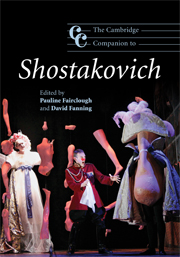Introduction
Published online by Cambridge University Press: 28 September 2011
Summary
The first English-language study to attempt a genre-focused overview of Shostakovich's music was published over a quarter of a century ago. Christopher Norris's Shostakovich: The Man and his Music was an early attempt to assess the major works (symphonies, operas, piano music and string quartets) by writers from a wide range of backgrounds: music critics, composers, performers, historians and literary theorists. Their retrospective of a composer who had died only seven years earlier captured a moment in time – British Shostakovich reception in the early 1980s – that is fascinating to look back upon. As with much intelligent critical writing about Shostakovich since the 1960s, the best chapters of this collection offered insights that are as valid and appealing now as they were in 1982, regardless of our enhanced knowledge of both Shostakovich and Soviet cultural history. Of particular interest is Robert Stradling's careful bypassing of the assumption that was to dog later popular writing on Shostakovich: namely that he was composing either ‘for’ or ‘against’ the Soviet system. In the case of Shostakovich, as of Richard Strauss, he noted, the ‘romantic ideology of doomed, suicidal genius is a potent but very partial myth’. Though Stradling's caution was typical for its time, it was soon to be swept away in a tide of startling critical self-confidence concerning Shostakovich's supposed anti-Soviet identity. This mythological dissident Shostakovich has enjoyed two decades of authority in music journalism, popular music writing and on the internet; and it is an accident of the different methodologies and publishing practices of journalism and scholarship that musicologists were apparently slow to counter it.
- Type
- Chapter
- Information
- The Cambridge Companion to Shostakovich , pp. 1 - 6Publisher: Cambridge University PressPrint publication year: 2008

